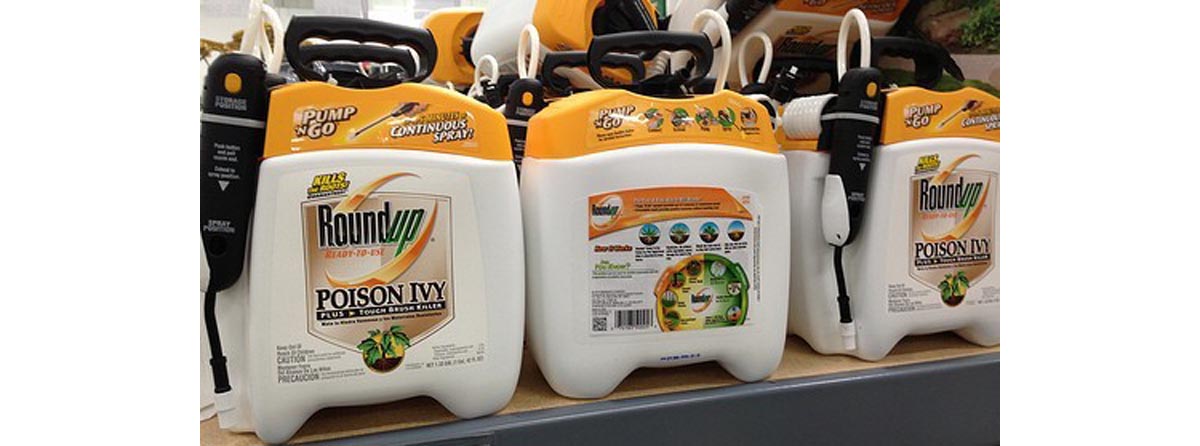Table of Contents
But isn't Roundup a horrible poison? Isn't Monsanto an evil company that doesn't care about destroying the environment and creating super-weeds? (Those super-weeds, by the way, are just plants that are resistant to Roundup. If you aren't going to use Roundup, then there's nothing about them that's "super.")

I won't speculate on the ethics of Monsanto as company, although they are not on my personal list of faves. But the ethics of squeezing farmers into having to use their products and the effects of the product on human health are two different things. Here's what we know, and don't, about the direct health effects of Roundup on humans.
1. The main health effects of Roundup aren't attributable to the glyphosate component that kills weeds. The really toxic component in Roundup is the wetting agent polyethoxylated tallow amine.
The ingredient that makes Roundup stick to plant leaves is the most toxic component of the product. It's essentially chemically modified beef tallow (which is to say, there is no such thing as a vegan product that has been treated by Roundup). Most of the toxic effects of Roundup in the environment are due to this wetting agent, not due to the glyphosate that kills weeds.
When I was in my 20's and had gone off to college, one of my neighbor's favorite farm hands was near death. The farmer had been told that glyphosate had no ill effects on human health, so Shorty, the farm hand, had worked with it without protective gear. The information from the Roundup salesman was correct as far as it went. Glyphosate has few or no direct effects on human health. The wetting agent does. Shorty, however, recovered, and lived another 30 years to the age of 77, working with some protective gear from then on.
2. Glyphosate breaks down quickly in the environment. We don't know about the tallow amines that are packaged with it.
When pro-Monsanto scientists tell you that Roundup breaks down fast, in as little as three days in a hot climate like Texas (although it takes up to two years for the product to break down in forests in arctic Sweden), they are telling the truth. Any effects of Roundup on the bacterial life, fungi, and worms in the soil are likely to be very short-term. But again, it's the wetting agent that's the problem.
There have been 453 impartial, scientific studies of the environmental effects of glyphosate. There are, as far as I know, only three studies of the health effects of polyethoxylated tallow amines. We know that in a test tube, this second major ingredient, that always is included with Roundup, breaks down the membranes of human cells as soon as it comes in contact with them. We actually don't, even 40 years since the product was put on the market, know exactly what this part of the Roundup formula really does. It's not unreasonable to assume it's toxic, but we don't know how toxic, or how long it's toxic.
3. The genetically modified (GMO) crops that tolerate Roundup may or may not have unusual effects on human health. The science just isn't getting published.
My first reaction to the assertion that eating genetically modified foods could cause various toxic reactions in human health was skepticism. After all, there isn't any food we eat that doesn't contain DNA. Our digestive tracts digest, for instance, a cheeseburger, without any risk of us developing a yellow complexion, or growing tufts of wheat behind our ears, or having strange urges to graze in a pasture and moo. That different genes are modified to make crops resistant to Roundup shouldn't cause different problems, because our digestive tracts digest that DNA, too. And even they didn't, it's not like you can plug in a soybean gene into the human genome just by physical contact.
Sometimes proteins made by plants can pass into the bloodstream without being broken down in the gut. And it's possible, although, again, not proven, that those proteins could cause various kinds of problems resembling autoimmune diseases.
So, is the solution to pick up a sign and protest Monsanto?
That's where the GMO corn and soybeans go. If you simply eat less processed food, you will avoid much of the impact of Monsanto's products on daily life. And you will have reduced the market for their possibly toxic foodstuffs. If you are an agricultural worker and you can't avoid exposure to Roundup, at least make sure you get fresh fruits and vegetables every day and take an antioxidant supplement. It can be something inexpensive, like alpha-lipoic acid. The antioxidant will mitigate the effects of exposure to the product.
When I was a teenager, I was in great shape. Part of it had to do with my father's imposition of an after-school "swing a hoe" exercise routine. Let some farm kid somewhere get into great shape now by eating as naturally as you can.
- Arjó G, Portero M, Piñol C, Viñas J, Matias-Guiu X, Capell T, Bartholomaeus A, Parrott W, Christou P. Plurality of opinion, scientific discourse and pseudoscience: an in depth analysis of the Séralini et al. study claiming that Roundup™ Ready corn or the herbicide Roundup™ cause cancer in rats. Transgenic Res. 2013 Apr. 22(2):255-67. doi: 10.1007/s11248-013-9692-9. Epub 2013 Feb 22. PMID: 23430588.
- Jasper R, Locatelli GO, Pilati C, Locatelli C. Evaluation of biochemical, hematological and oxidative parameters in mice exposed to the herbicide glyphosate-Roundup(®). Interdiscip Toxicol. 2012 Sep. 5(3):133-40. doi: 10.2478/v10102-012-0022-5.
- Photo courtesy of Scot Nelson by Flickr : www.flickr.com/photos/scotnelson/5681320194/
- Photo courtesy of Vilseskogen by Flickr : www.flickr.com/photos/vilseskogen/8771250413/

